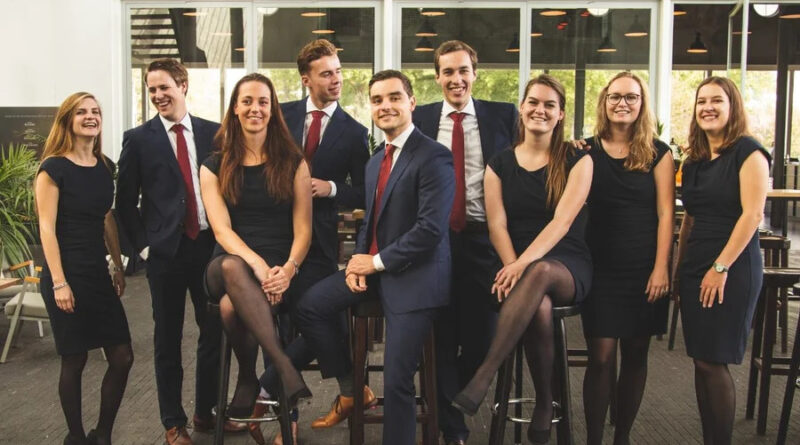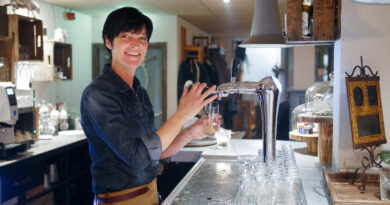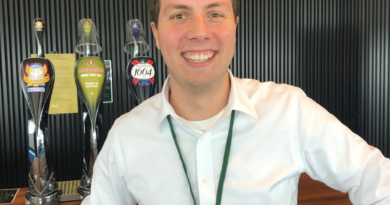Need Some Help With Life? Bas Might Be the Guy For You
It is about 14.00 hours when we meet Bas at the rooms in building E. He entered the building at 8.00 hours this morning and has been occupied ever since. Yesterday he attended an inhouse day, this morning he had a meeting with a representative of the university and had also been busy arranging things concerning a possible partnership with Unilever. Luckily, he was able to free some time in his schedule to speak about his life as independent chairman of Asset and to answer some rather unusual questions we’d asked him. text by: Jelle Sieben & Janne Vos
To summarize the first 15 minutes of the conversation, here is the standard information you need to know about Bas:
Bas Ramaekers is 22 years old and currently in the board of Asset General. He completed his bachelor in Econometrics and Operations Research and is doing a master in Business Analytics and Operations Research. During his bachelor, he decided to become an active member at Asset | Econometrics. After having done multiple committees at our study association, he found himself ready for a bigger challenge and wanted to do something new. He did not feel the need to graduate and get a job; however he wanted to do something useful. Since some of his close friends were in the board of Asset | Econometrics, he already had an idea of what a board year at this department would look like. As he was looking for a new challenge, he decided to apply for the role of independent chairman (IC) of Asset. The Association for Students Studying Economics in Tilburg (ASSET) consists of seven departments and the MAK, hence the general board of Asset consists of eight chairmen and one independent chairman, Bas.
Bas explains his function as follows:
As IC you represent Asset to the outside world. He is the contact for the university, some companies and other study associations. His meetings with the university are mostly related to subjects such as career orientation, master orientation or partnerships. For instance, next academic year there will be a new bachelor program at TiSEM. Bas is involved in, for example, looking at how Asset can contribute to this new bachelor. Moreover, he is involved in promoting events, contributing to trainings and making multiple other arrangements. An example of these arrangements is that Asset makes sure days are scheduled lecture free during the EBT weeks.
Since his tasks cover such a wide area, every day is different as IC. Obviously, meetings are planned beforehand. However, besides these meetings, he often does not know exactly on Monday morning what the week will offer him. Often, on a Monday, people start showing up at his desk. They offer him problems that require a solution, remind him of certain problems or inform him of new opportunities. With these things he consequently gets started and processes the obtained information. He also explains that simply gathering information (through meetings) is very time consuming. As the point of contact you obviously need to know everything what’s going on with the university and with Asset.
The aspect he likes most about his function is improving things. “Of course, it is satisfying and necessary to solve problems. However, I prefer improving things or coming up with new ideas to see how things can change. A board year is not only simply following the steps of your predecessor’’.
The thing he probably dislikes the most is solving little arguments. Whenever departments are arguing and don’t find a solution, it is Bas’ responsibility to find a solution that suits all the involved parties. This often concerns cases that seem important at the level of departments, but don’t really matter looking at the bigger picture. For example, who gets how many tickets for the COdE cantus?
The stuff you just read, were written down based on answers we received from Bas. We didn’t feel much for only asking standard, somehow boring, questions and after getting to know some things that Bas was doing with his time at Asset, we wanted to ask some different kinds of questions to really get to know Bas.
So let’s start with the, possibly uncomfortable, next part. “If you had to choose, which department do you like the most?”
“I like every department as much as the others, of course. As I’m the indep.. blablabla” Bas didn’t really say blablabla, but surely you can guess the nature of his words. After having to listen to this politically correct answer, we asked him about the Asset boardies’ alleged high use of drugs. With the room being silent for a few seconds, we could clearly see Bas’s thoughts from his look. How am I going to find another boring and correct answer to this tiresome and provocative question?
“Uhm…. Within Asset we don’t stimulate the use of drugs and there’s definitely no such thing during office hours.” Thanks Bas!
It was clear to us we wouldn’t be able to catch a mistake in Bas’ words. Maybe we had more luck asking him a difficult mathematically oriented question. We knew Bas always was a smart guy, but is the board year affecting his mathematical skills? We asked him to solve a pretty difficult integral:
It took Bas exactly 8 minutes and 18 seconds to obtain the correct answer. A bit slow, right? This may be because we first accidentally asked him to solve a by-hand-unsolvable integral (well job, Janne).
Alright, back to normal. “Bas, where do you see yourself in five years?” “I hope that, in five years, I’ve bought my own house and that I have a team, filled with people in all sorts of fields of expertise, amongst me that I’m able to direct. I would like to be able to direct these people as I, hopefully by then, possess some knowledge in every expertise. Maybe this will be at some consultancy firm, but who knows. Maybe I’ve found my calling completely elsewhere.”
We were wondering if Bas had a good question for himself, that we definitely should be asking him. He did have one, so that’s when we asked him: “How does one become the IC of Asset?” Bas explains. Of course you have to be really driven to get in the position he’s currently in. You won’t be called at random with the message that you just became the IC. Somewhere in March (or maybe April), you have the possibility to apply. You start with sending a letter of application together with your curriculum vitae, so most importantly your motivation and why especially you would be fit for the job. After this, you’re asked to complete some e-assessments that contain for example personality tests or having to hand in some feedback given by the people that stand close to you. Then you would be invited for two conversations where the, at that time, the current IC together with other chairmen will ask some questions about what to do in certain situations and other weird questions. For example, how many ping-pong balls can fit in the Esplanade Building (the building that houses Asset). After having discussed this for probably over five minutes, we continued to the next question.
With the next question, a short story had to be told. “Alright Bas, imagine you’re living a beautiful life in a beautiful home. You have two babies: Asset Tilburg and Asset | Econometrics. Suddenly, your house is on fire and you’re only able to save one baby. Which baby will you save?”
“Well, as Asset | Econometrics is part of Asset Tilburg, I would definitely save Asset Tilburg.”
An answer we already expected. Now we changed the story and named the babies Asset | Econometrics and Asset | Marketing. “What will you do now, Bas?” Bas stayed quiet for quite some time and Janne had to count down: “3,2,1, what’s your final answer?” Bas couldn’t think of a right answer and thanks to his independence, both babies didn’t survive.
By now we already knew much more about Bas then we did before, however we were still not satisfied. There was one thing that Janne always wanted to know about Bas, and in the most serious way she could, she asked him the following question. “So, Bas, does your position as IC give you a better position on the market?’’ Bas was looking a bit doubtful after Janne asked him this. “A better position when you concern dating and seducing women.’’ We were both very curious for his answer. Would we, again, get the very politically correct answer we were used to by now? Surprisingly, we did not. “Well, not in a direct way. However, I am aware of the fact that in a lot of committee rankings, I am worth a certain amount of bonus points.’’ Since we are living in 2020 and should in any case be very aware of objectification of women, or in this case men, we were very concerned. “Are you okay with that Bas, are you really okay with that?’’ Bas chuckled and replied that he didn’t care much about it.
To keep this interview abreast of the times, we had to ask Bas something about the coronavirus. “How much money would you have to be paid to ‘voluntarily’ get infected by the coronavirus?” Bas looked at us as if we were some complete nitwits, but answered the question very rationally, as we could have expected by now. “Well, many of my friends study econometrics, as do I, and they say one in three econometricians becomes a millionaire, so too little money hopefully won’t be an issue for me in the future. Also, considering my health is pretty good and the virus is most dangerous for elderly, at least that’s what I heard, I’ll stick the price at 150 million euros.” Jelle was also curious what Janne’s answer would be to this question. Janne explains that she has a relatively weak immune system and gets sick pretty quickly. “The virus will probably bear more risk to me, so I would say more than 150 million euros as I quite like my life”, she says.
Time to switch the subject again. We asked Bas what his perfect Sunday mornings look like. On a perfect Sunday morning, Bas prefers to stay in bed a little longer than he does on weekdays. After that, he will go for a morning run and come home to make himself breakfast. Very important is that no coffee is involved in this breakfast. “Coffee is something that you drink to stay awake, which is not necessary on a Sunday”, Bas jokes. After breakfast, he prefers to just chill during the afternoon. Maybe visit his grandparents once in a while, watch some sports afterwards. Formula 1, football, tennis; there is no sport that he doesn’t like.
A few days before this interview, we were together with the D&A committee of last year. One of the people present was Emma. Since Emma is the Editor-in-Chief of Nekst, we thought it would be useful to ask her for some extra insights. “Emma, is there one thing in your life that you’d like to know that we could perhaps ask Bas?’’, Janne asked. There definitely was one thing. As a big fan of fries, Emma wondered how many fries she could eat in one hour. We both nodded and Jelle added this question to the list on his phone of questions we already came up with. After having asked this particular question, as we were used to by now, Bas tried to use logical reasoning to formulate an answer. The first step in his reasoning was to gather all the information necessary. “What kind of fries? Fries from the Tropical or MacDonald’s fries? Is she hungry? Is sauce included?”. We replied with “MacDonald’s, yes, yes” and Bas started thinking. Saying that in one packaging of MacDonald’s fries there are 4 rows of 10 fries and Emma could probably eat 10 packagings of fries, he came to the final answer of 400 fries in one hour for our Editor-in-Chief. If you are reading this and are curious to find out whether Emma can satisfy this prediction, we invite you to approach and challenge her.
At this moment of time, the interview started to take a bit long. The Asset Pre-Carnaval Party was taking place that evening and we both had places to go to. Moreover, Bas had independent chairman things to do. We were satisfied with the answers we received from Bas and we had asked all the questions that kept us awake at night. If you ever have some useless questions, we’re sure Bas would like to help you analytically come up with a good answer.




